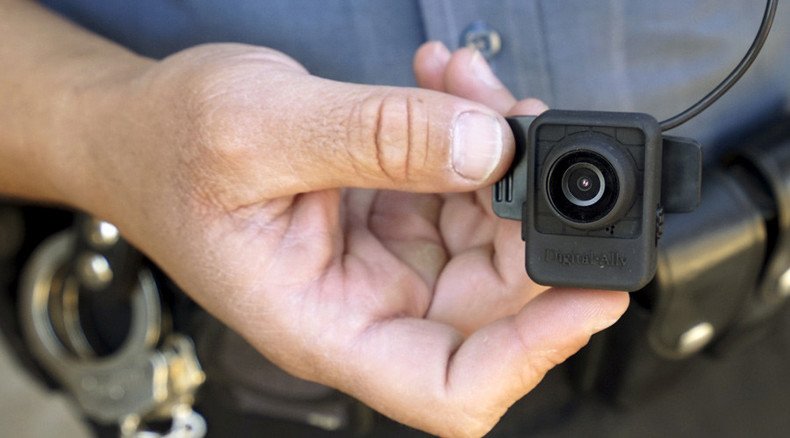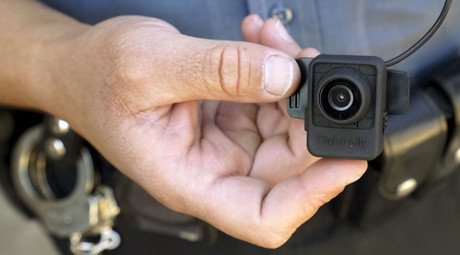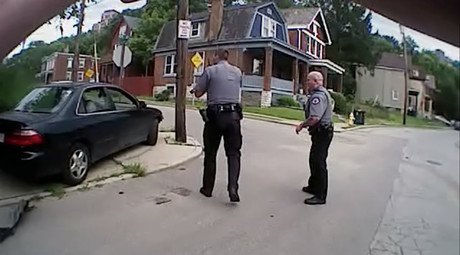N. Carolina cop talks to suicidal man with knife, prevents deadly force situation

A police officer in Roanoke Rapids, North Carolina is receiving praise for disarming a man wielding a knife who claimed he wanted to hurt himself. Footage of the July incident, captured by the officer's body camera, has now been released.
David Bundy called 911 on July 27, claiming that he was hearing voices after smoking marijuana. Bundy, 39, had also skipped taking his prescription medication.
Body cam shows Roanoke Rapids officer disarming suicidal man: http://t.co/mBvu3AfUr9#wralpic.twitter.com/LCUb7z0ebE
— WRAL NEWS in NC (@WRAL) August 7, 2015Officer Jamie Hardy, who police said is trained in de-escalation tactics, was sent to check on Bundy. Hardy began the conversation by asking, "What's going on today?" Body-camera footage of the incident was released on Thursday.
Bundy said he was thinking of killing himself. According to the Roanoke Rapids Daily Herald, Hardy said he noticed Bundy was gesturing with his left arm while his right arm stayed close to his body.
The pair continued talking until Hardy asked Bundy what he had in his back pocket. Hardy eventually took hold of Bundy's arms.
“Stop, stop, stop. Calm down. Everything’s alright,” Hardy said. “Is it a gun? Is it a knife?”
READ MORE:Police brutality: How UK cops disarmed knife attacker and why it stirred debate over US practices
Bundy then admitted he had a knife, as he continued to struggle.
“Can I get it? Please?,” asked Hardy.
Bundy said he wanted to cut himself. Hardy, still holding Bundy with both hands, asked him to not pull the knife out.
The officer asked an onlooker to call 911 since both his hands were occupied.
Hardy continued to speak calmly to Bundy, urging him not to hurt anyone or himself.
“Just talk to me, OK?” Hardy can be heard in the recording. “Don’t take that knife out. No sir. I don’t want you to hurt yourself, and I don’t want you to hurt me either. Look at me, I’ve got a little kid at home, OK? I want to go home to him, OK? And I don’t want anything bad to happen to you, that’s why I’m here. So just stop, OK? Everything’s going to be OK, but I need you to take your hand off of that.”
Bundy struggled again, and Hardy took him to the ground. Paramedics on the scene then helped the officer secure the knife.
Police brutality protests forced 24 states to pass 40 new police reform measures http://t.co/jytSY0a1NUpic.twitter.com/rxEKS09Url
— RT America (@RT_America) August 4, 2015“This is a textbook case of using deescalation skills,” said Roanoke Rapids Police Chief Chuck Hasty “[Hardy] made it personal, telling him, ‘Hey, I have a kid at home.’ I’m very proud of Jamie.”
Hasty said that the encounter "could have possibly been a deadly force situation, and those skills he used prevented that."
Bundy and Hardy met again on Thursday, according to WRAL. Bundy was grateful for Hardy's calm, saying he would like to stay in contact with the officer.
"If it weren't for him, I wouldn't be here today," Bundy said. "He saved my life."
The Roanoke Rapids Police Department has body cameras for 26 patrol officers in the town of about 16,000 residents, according to WRAL. The department is raising money to purchase cameras for all its officers.
Body-camera use among law enforcement has spiked ever since the civil unrest that followed the fatal shooting of an unarmed black teenager by a white police officer in Ferguson, Missouri last year. Since then, 16 states have passed body-camera measures. Some passed laws ‒ including detailing how the cameras could be used ‒ while others passed resolutions to create study panels or provide state grants subsidizing the purchases of the cameras.
Surveys in recent years have indicated that about 25 percent of the 17,000 police agencies in the US are using body cameras, while many more are considering their use.
In December, President Barack Obama announced that he was seeking $263 million to, in part, purchase 50,000 body cameras for police across the US.














